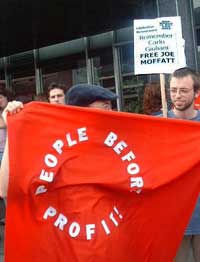 Just as Nepali anti-globalisation activists joined thousands of others from around the world in this Brazilian port city this week, a Nepali business delegation is touring the United States and Canada to seek duty and quota-free access to Nepali garments. The irony of it is not lost on the dozen-strong Nepali delegation here.
Just as Nepali anti-globalisation activists joined thousands of others from around the world in this Brazilian port city this week, a Nepali business delegation is touring the United States and Canada to seek duty and quota-free access to Nepali garments. The irony of it is not lost on the dozen-strong Nepali delegation here. Nepal is set to join the WTO within a year and hopes to benefit from a rule-based trading regime that will throw open the world market for its products like hand-woven carpets, pashmina, and readymade garments. But WTO and its fifth ministerial meeting in Cancun in September is exactly what the activists gathered here are protesting against.
This is the World Social Forum (WSF), billed as the "Third World Davos", where birds of a feather-activists, academics, intellectuals, with some professional junketeers-who oppose the World Bank, IMF and WTO have been gathering since last year. They say the WTO will make rich countries richer by flooding poorer countries with their subsidised produce, while rich country markets will continue to be closed to Third World exports.
The rallying cry here is "No New Round", and this slogan is emblazoned on the T-shirt of every other delegate. They say the WTO has a non-democratic decision-making process which will further marginalise developing countries in WTO decisions and benefits. The WTO maintains that globalisation will benefit all and spread prosperity. But Porto Alegre already seems to have an impact on the WTO, which has now started talking about "globalisation with a human face".
Unlike the cold and sterile Swiss ski resort, Porto Alegre is a vibrant, tropical city in the middle of the southern hemisphere summer. "Porto Allegre is the future while Davos is the past," says Filipino activist Walden Bello of the Bangkok-based think tank, Focus on the Global South.
Bello is here with leftist intellectuals like Noam Chomsky, Tariq Ali and Samir Amin to enforce the forum theme, "Another World is Possible". The conference is being held amidst the drumbeats of a possible war against Iraq, which activists here call a "blood for oil" conflict. "The US war against terrorism is a perfect cover for the failure of the neo-liberal economic doctrine," says Ian C Rivera of the Hong Kong-based Asian Alliance for Peace.
Porto Alegre hopes to address the issue of a growing global gap between rich and poor. The world's richest 20 percent now own 86 percent of the world's GDP, while the poorest 20 percent have only 1 percent. Three of the world's richest people have assets greater than the combined output of 48 of the poorest nations.
To balance this, activists are pushing for the "Tobin Tax" on international currency transactions that could raise $45 billion a month to ease world poverty.
Cancellation of debt is the other demand. Highly indebted developing countries-Nepal among them-transfer more to service their debt to the North than they receive in aid. Nepali and South Asian delegates here are also raising issues like untouchability and protecting the rights of indigenous peoples.


